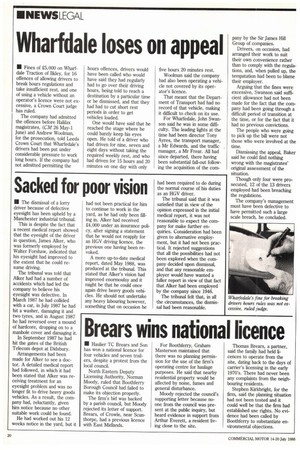Wharfdale loses on appeal
Page 18

If you've noticed an error in this article please click here to report it so we can fix it.
• Fines of 25,000 on Wharfdale Traction of Ilkley, for 16 offences of allowing drivers to break hours regulations and take insufficient rest, and one of using a vehicle without an operator's licence were not excessive, a Crown Court judge has ruled.
The company had admitted the offences before Halifax magistrates, (CM 26 May-1 June) and Andrew Woo'man, for the prosecution, told Leeds Crown Court that Wharfedale's drivers had been put under considerable pressure to work long hours. If the company had not admitted permitting the hours offences, drivers would have been called who would have said they had regularly had to go over their driving hours, being told to reach a destination by a particular time or be dismissed, and that they had had to cut short rest periods in order to get vehicles loaded.
One would have said that he reached the stage where he could barely keep his eyes open. He told of a driver who had driven for nine, seven and eight days without taking the required weekly rest, and who had driven for 15 hours and 20 minutes on one day with only five hours 20 minutes rest.
Woo!man said the company had also been operating a vehicle not covered by its operator's licence.
That meant that the Department of Transport had had no record of that vehicle, making it difficult to check on its use.
For Wharfedale, John Swanson said he was in some difficulty. The leading lights at the time had been director Tony Ayres, the transport manager, a Mr Edwards, and the traffic manager, a Mr Frear. All had since departed, there having been substantial fall-out following the acquisition of the corn pany by the Sir James Hill Group of companies.
Drivers, on occasion, had arranged their work to suit their own convenience rather than to comply with the regulations, and, when pulled up, the tempatation had been to blame their employer.
Arguing that the fines were excessive, Swanson said sufficient allowance had not been made for the fact that the company had been going through a difficult period of transition at the time, or for the fact that it had no previous convictions.
The people who were going to pick up the bill were not those who were involved at the time.
Dismissing the appeal, Baker said he could find nothing wrong with the magistrates' original assessment of the situation.
Though only four were prosecuted, 12 of the 13 drivers employed had been breaching the regulations.
The company's management must have been defective to have permitted such a large scale breach, he concluded.














































